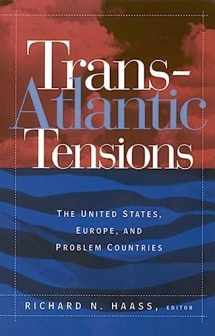
Trans-Atlantic Tensions: The United States, Europe, and Problem Countries
ISBN-13:
9780815733515
ISBN-10:
0815733518
Author:
Richard N. Haass
Publication date:
1999
Publisher:
Brookings Institution Press
Format:
Paperback
263 pages
FREE US shipping
Book details
ISBN-13:
9780815733515
ISBN-10:
0815733518
Author:
Richard N. Haass
Publication date:
1999
Publisher:
Brookings Institution Press
Format:
Paperback
263 pages
Summary
Trans-Atlantic Tensions: The United States, Europe, and Problem Countries (ISBN-13: 9780815733515 and ISBN-10: 0815733518), written by authors
Richard N. Haass, was published by Brookings Institution Press in 1999.
With an overall rating of 3.9 stars, it's a notable title among other
books. You can easily purchase or rent Trans-Atlantic Tensions: The United States, Europe, and Problem Countries (Paperback) from BooksRun,
along with many other new and used
books
and textbooks.
And, if you're looking to sell your copy, our current buyback offer is $0.46.
Description
Americans and Europeans are divided by more than an ocean when it comes to designing and carrying out policies toward countries that repress human rights, develop weapons of mass destruction, and/or support terrorism and subversion. Accounting for this divide are distinct interests, domestic politics, and above all profound disagreements between Americans and their counterparts in European capitals and Brussels over what tools of foreign policy--sanctions, engagement, military force--to empty to change the behavior of problem countries. The result is that Americans and Europeans often work at cross purposes--and that disagreements over policy toward problem countries threaten both to undermine efforts that promote desired change and transatlantic cooperation in other areas, be it within Europe or in building an open world trading system. This book examines the "problem" countries of Cuba, Iran, Iraq, Libya, and Nigeria. The authors explain sources of American and European differences, consequences for policies designed to influence problem states, and prospects for bridging transatlantic policy rifts. A conclusion by Richard N. Haass places these differences in perspective and suggests what Europe and the United States need to do to ameliorate this tension--and what could transpire if they do not.


We would LOVE it if you could help us and other readers by reviewing the book
Book review

Congratulations! We have received your book review.
{user}
{createdAt}
by {truncated_author}


